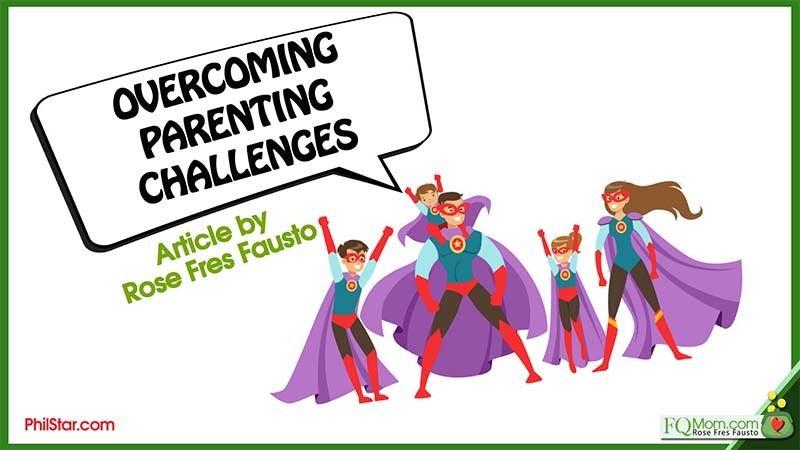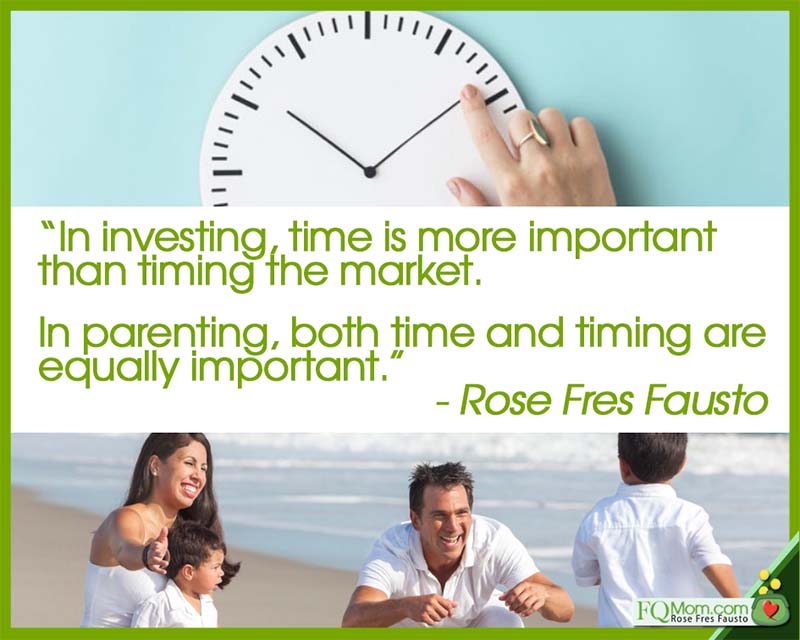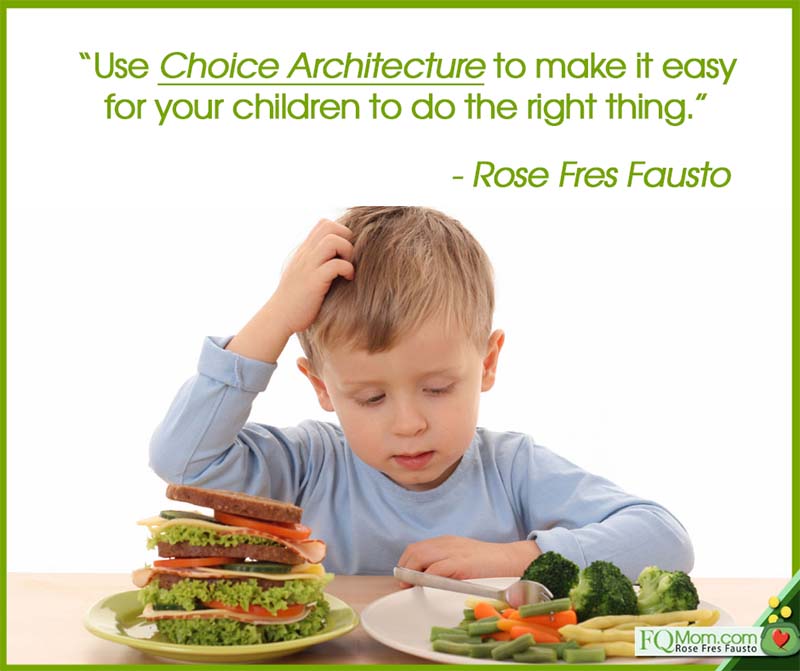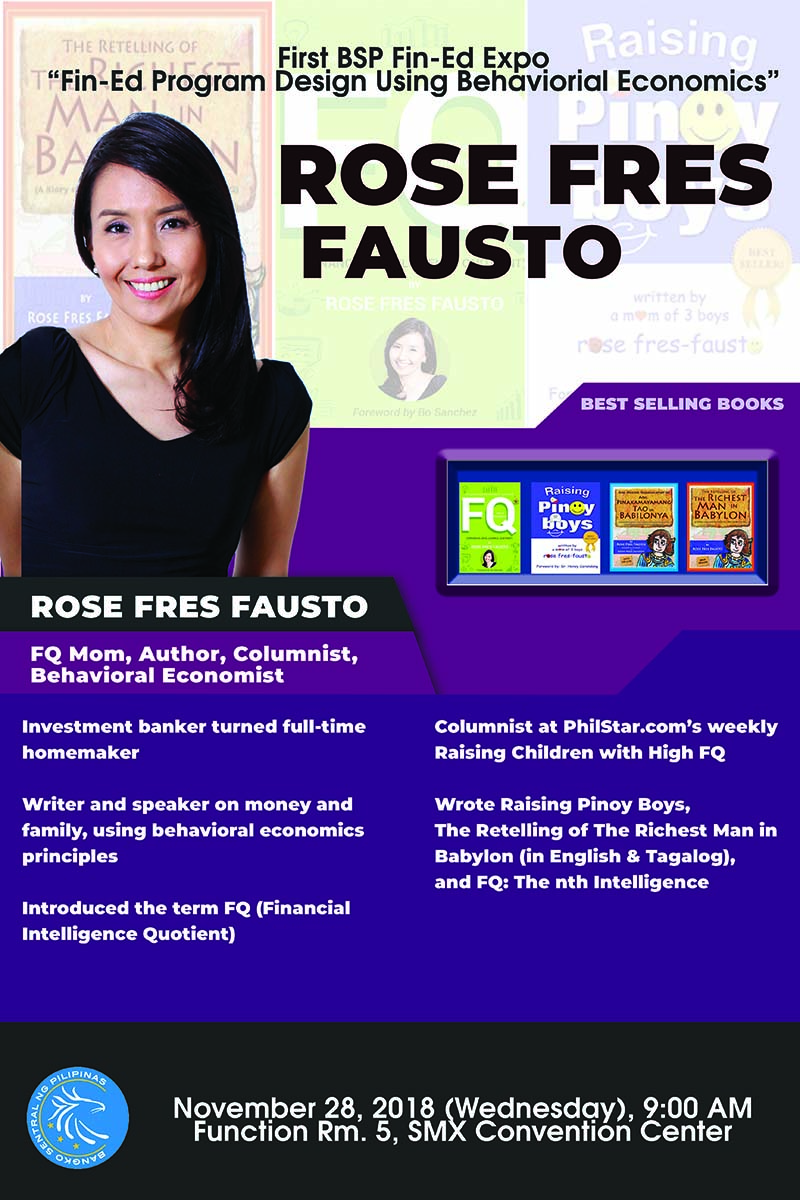Overcoming parenting challenges


Tomorrow, I will share the stage with my husband Marvin and our youngest son Anton at the country’s biggest Catholic inspirational and learning event to talk about how to make parenting challenges more fun.
When we were asked to speak on this topic, I thought it was best for the audience to hear from one of our sons because I believe in the saying “The proof of the pudding is in the eating.” It means the real value of something can be judged only from the practical experience or results and not just from the theory.
I sometimes call my sons my puddings. I guess it’s because my credibility as a resource person in parenting is derived from them. I am not saying that they are perfect but I’m proud of how each one turned out as a young adult.
People who write and talk about parenting are usually those who studied child development, experts who work closely with families and learn from different cases of child rearing, or maybe a celebrity who just gave birth and got a book deal or show to share her experiences as a parent, never mind if she’s not yet done baking her pudding yet! ![]()
Time is important
Just like in investing, time is also very important in parenting. But unlike investing where we always say “Time is more important than timing the market,” I think the timing is equally as important in parenting. I mean, if you were absent during their formative years, that’s it, you just missed those most crucial years in their development.
I am very thankful for the gift of time that I was able to devote to our sons’ growing up years. If you’ve been reading my books and articles, you know that I gave up my investment banking career to devote my focused and undivided attention to their growing up years. I was not always in a hurry anymore. I had a bit more time reading and learning about the most important task at hand, attending talks and seminars on weekdays, “recording my findings” through my journals. Most importantly, I was able to use unhurried time listening, observing and responding accordingly to each child’s unique needs. You see, I even had time to teach them how to prepare their own Balance Sheet as early as grade school! ![]()

Common denominators
I enjoyed raising our sons, despite the many challenges we faced. There are three main common denominators that helped us in our parenting.
1. Communication. We endeavored to have an open, healthy and effective communication with our children. We used techniques to talk to them in an effective and efficient way. We had our own FB right outside our bedrooms. FB stands for Fausto Board ![]() where would put our messages to each other. Sometimes, we would even share quotes on the board. Later on, we observed that the fastest and surest way to communicate to one another was through that handheld device called phone. So today we have a whatsapp chat group where we talk to each other to make sure that the message reaches everyone wherever each member is at the moment.
where would put our messages to each other. Sometimes, we would even share quotes on the board. Later on, we observed that the fastest and surest way to communicate to one another was through that handheld device called phone. So today we have a whatsapp chat group where we talk to each other to make sure that the message reaches everyone wherever each member is at the moment.
We are also have each other’s social media friends and followers. I hear some parents say, “My daughter/son does not want me to be her/his friend/follower.” Not a good idea, especially for parents with young children. We should know what information our children are putting out there for the entire world to see.
But of course, the best mode of communication still happens during meals. Family dinners, lunches are a gem in parenting that should be maximized in usage. Unfortunately, with today’s busy world and traffic, daily family dinner has become a luxury. At the very least, schedule something more than once a week of unhurried and relaxed conversation with your children, with no cellphones please.

2. Design and nudges. I am a big believer in Choice Architecture (the use of design in presenting choices in order to nudge someone make the right choice). Long before I encountered Behavioral Economics, I was already applying this principle in my parenting.
Here’s a short story. When they were still in their early grades, I listened to a Jesuit talk about the kind of education they wanted for their students. He said, “We want our students to learn by design, so that learning will not only be limited to those who are book smart or very studious.” I went home that day saying to myself, “I want our parenting so designed such that it would be hard for our sons to not excel and succeed in life! They will succeed by design!” Quite a lofty dream for this young idealistic mother.
We endeavored to only give the choices that are good for our sons.
a. It could be as simple as asking the question, “Would you rather brush your teeth now, or after 15 minutes?” instead of “Are you going to brush your teeth or what?”
b. We gave their weekly allowance every Sunday with an automatic 20 percent savings, inculcating “Pay yourself first” early on.
c. No TV and computer games on weekdays in order to encourage them to play outside at the park and avoid becoming the lethargic gizmo-addict kids.
d. Fruits and vegetables are staples in each meal.
e. Annual goal-setting every yearend to encourage them to be purposeful and be in charge of where they want to lead their respective lives guided by their values.
Again, I’m not saying that my sons are perfect individuals because they’re not, but all these design elements make it easier for them to make the right choices.

But the truth is, no design is fail-proof. That is why we need the third one.
3. Prayer and belief in God. No matter how you want to call it, there is a force out there stronger than anything, and also puts everything in order. No matter how hard we parents try, no matter how well we plan everything, something can go wrong. And we are only left with the faith that everything will be fine because God is with us. We remind our sons of the infinite power of God’s love, “When you are facing a great challenge, and you feel that everything fails including Papa and Mama’s love, always remember that God’s love never fails.” My prayer is that this will always guide them so that even if we won’t be around anymore, they will never lose hope and faith.
How about you, what have helped you overcome your parenting challenges? ![]()
*********************************
ANNOUNCEMENTS
1. Our FQwentuhan for this week will be extra special! I will be sharing the stage with the honey (Marvin), and bunso (Anton) in this year’s Kerygma Conference. Stay tuned for our FQwentuhan Live! On Thursday, November 22, 11:00 am via FQ Mom Facebook page. ![]()

2. I’ll be at the Bangko Senral ng Pilipinas’ 1st Financial Education Stakeholders’ Expo on Nov. 27 to 28, 2018 (Tuesday to Wednesday) at the SMX Convention Center, Manila. On Day 2, November 28 (Wednesday), I’ll be giving a talk on “Fin-Ed Program Design Using Behavioral Economics” and also moderating the plenary session on Innovations in Financial Education. I hope to see you there! ![]()

3. Thanks to those who already bought the FQ Book, especially to those who took the time out to send me their feedback. Your feedback is food for my soul. To those who have not gotten their copy yet, here’s a short preview of “FQ: The nth Intelligence.”
You may now purchase the book in major bookstores, or if you want autographed copies, please go to FQ Mom FB page (click SHOP), or FQMom.com (click BOOKS), or email us at FQMomm@gmail.com.
4. Want to know where your FQ stands? Take the FQ Test Challenge now! Click link: http://rebrand.ly/FQTest

Rose Fres Fausto is a speaker and author of bestselling books “Raising Pinoy Boys” and “The Retelling of The Richest Man in Babylon” (English and Filipino versions). Click this link to read samples – Books of FQ Mom. She is a behavioral economist, a certified Gallup strengths coach and the grand prize winner of the first Sinag Financial Literacy Digital Journalism Awards. Follow her on Facebook & YouTube as FQ Mom, and Twitter & Instagram as theFQMom. Her latest book is “FQ: The nth Intelligence.”



















